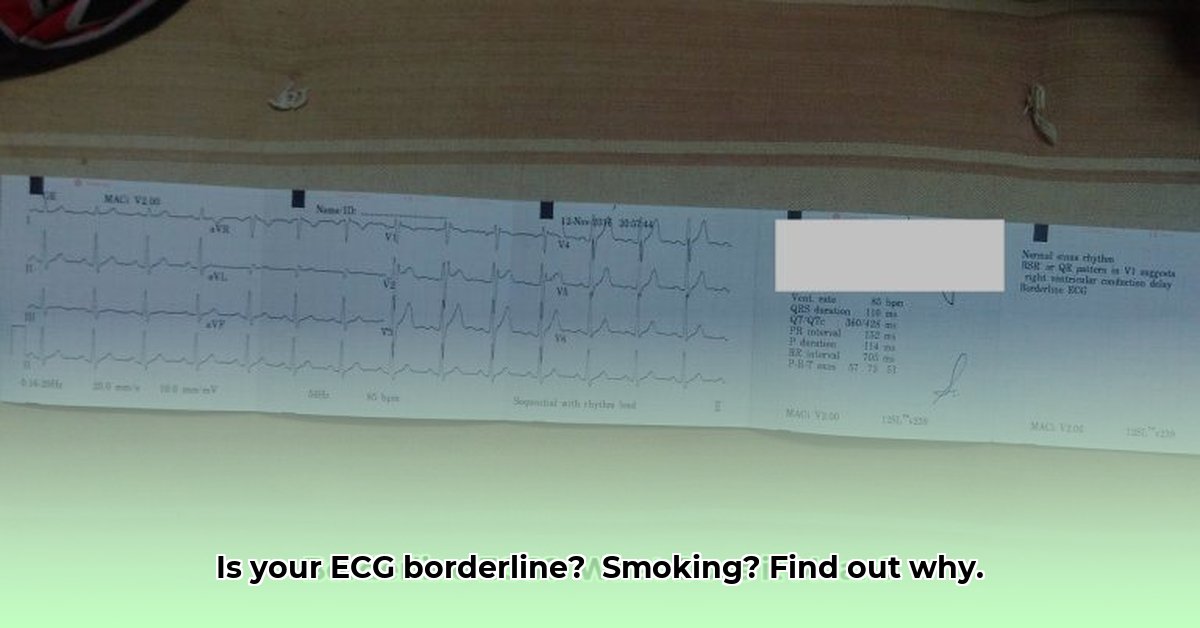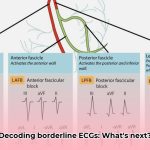Getting a “borderline” ECG result can be confusing and a little scary. It means your heart’s electrical activity showed something a bit unusual, but not clearly abnormal. This article explains what that means, what might cause it, and, importantly, what you should do next. We’ll look at the connection between smoking and these borderline results—it’s a significant one! We’ll give you clear steps to take, whether it’s scheduling a follow-up, making healthy lifestyle changes, or quitting smoking. We’ll also cover what your doctor should do to help you understand your results and keep your heart healthy. This guide will help you understand your ECG results and take control of your heart health. For more information, see this helpful guide on borderline ECG results.
How to Interpret Borderline ECG Results and Next Steps
Let’s talk about something that might sound a little scary: a borderline ECG. Don’t panic! It doesn’t automatically mean you have a major heart problem. Think of it like this: your car’s “check engine” light came on – it’s not a total breakdown, but it definitely needs attention. It’s crucial to understand that early detection and intervention can significantly improve outcomes.
What’s a Borderline ECG, Anyway?
A borderline ECG result means your heart’s electrical signals showed some slight irregularities during the test. The doctor saw something a little unusual, but it wasn’t clear enough to make a firm diagnosis. It’s like a puzzle with a few pieces missing – more information is needed to get the whole picture. The test points towards the possibility of something needing further investigation, prompting your healthcare provider to delve deeper.
Causes of Borderline ECG Findings & Heart Health
There are many reasons why your ECG might show these slight irregularities. Sometimes, it could indicate a deeper underlying heart condition that needs attention. However, often, lifestyle factors play a huge role. Smoking is a major one. Other things that can affect the results include high blood pressure, stress, certain medications, or even a tiny mistake in how the ECG was performed. It’s important to understand that several factors could contribute to an unclear result. Did you know that electrolyte imbalances can also impact ECG readings, as can extreme physical activity?
Lifestyle Changes: The Significance of Smoking and ECG Abnormalities
Research strongly suggests a link between smoking and irregular heart rhythms detected on an ECG, even those that are “borderline.” Smoking damages your blood vessels, making it harder for your heart to pump blood efficiently. It also interferes with your heart’s electrical system, which is what the ECG measures. Nicotine, a key component of tobacco smoke, may be an important trigger for these arrhythmogenic effects. So, if you’re a smoker, your habit could be making those irregularities you see on your ECG more likely. Smoking significantly increases your risk of heart disease and other complications. It’s crucial to address your smoking habit if you’re aiming for a healthier heart.
What to Do If You Have a Borderline ECG: Your Action Plan
Receiving a borderline ECG result might feel unsettling, but taking proactive steps can ease your mind. Here’s what you should do:
Step 1: Talk to Your Doctor: Schedule an appointment to discuss your results and any symptoms you might be noticing. They’ll consider everything – your family history, current habits, and the specifics of your ECG report.
Step 2: Lifestyle Changes – It’s Crucial: This is where you can make a significant difference. The most important is quitting smoking. If you’re a smoker, your doctor can provide resources and support to quit and improve your overall cardiovascular health. Beyond smoking, other lifestyle changes can help. Aim for regular exercise, a balanced diet rich in fruits and vegetables, and find ways to manage stress, such as yoga or meditation. Studies show that lifestyle changes can significantly improve borderline ECG readings.
Step 3: Further Testing, If Needed: Your physician may recommend additional tests, such as a stress test (to see how your heart performs under exertion), an echocardiogram (an ultrasound of your heart), or a Holter monitor (a portable ECG that records your heart’s activity over a longer period), to get a clearer, more detailed picture of your heart’s health.
Step 4: Medication Review: Certain medications can affect ECG results. Your doctor will review your current medications to identify any potential contributors to the borderline ECG. They may suggest alternatives if necessary.
Step 5: Follow-Up Care: Regular check-ups are essential to monitor your heart health, making adjustments as needed, and preventing potential problems down the line. Staying in close contact with your doctor is your best approach.
The Role of Healthcare Providers in Interpreting Borderline ECGs
For healthcare providers, interpreting a borderline ECG requires a holistic approach:
- Complete Patient History: Take a detailed medical history, including whether or not the patient smokes, medications, and any existing conditions like high blood pressure.
- Thorough Physical Exam: A comprehensive physical examination helps provide additional clues.
- Additional Testing If Necessary: Order further tests based on the patient’s individual needs and the ECG findings. Such as Stress tests, and repetitive ECGs.
- Clear Patient Communication: Explain the results to the patient in easy-to-understand terms, answering any questions patiently and honestly.
- Lifestyle Counseling: Strongly encourage lifestyle modifications, especially emphasizing smoking cessation and its importance for heart health.
Further Research and Technological Advancements in Heart Monitoring
Exciting technological advancements are continually improving the way we interpret ECGs. New tools utilizing artificial intelligence (AI) promise even more precise analysis, potentially allowing for earlier detection and more accurate prediction of heart problems. Research is ongoing, and things are constantly evolving!
Understanding Your Cardiovascular Risk: A Quick Look
This table summarizes the likelihood and potential severity of various factors that could contribute to a borderline ECG. Remember, this is a general overview; your doctor’s assessment is what really matters.
| Factor | Likelihood of Problem | Severity of Problem | Overall Risk | How to Reduce Risk |
|---|---|---|---|---|
| Underlying Heart Condition | Possibly | Significant | Moderate to High | Careful monitoring, timely treatments |
| Smoking | High | Significant | High | Quit smoking immediately; seek help if needed |
| High Blood Pressure | Possible | Moderate | Moderate | Monitor blood pressure, medication if needed, lifestyle changes |
| Electrolyte Imbalance | Uncommon | Moderate | Low | Balanced diet, physician consultation if you have concerns |
| Medication Side Effects | Possible | Varies | Low to Moderate | Discuss medications with your physician, potential alternatives |
| Stress & Anxiety | Possible | Mild | Low | Manage stress through techniques like exercise or meditation |
| Technical ECG Error | Rare | Minimal | Low | Repeat the ECG test if there are concerns about its accuracy |
Reduce Heart Risks: The Bottom Line
A borderline ECG and smoking together represent potential cardiovascular risks, but it’s not a guaranteed problem. By proactively managing your health – particularly quitting smoking and adopting a healthier lifestyle – you can greatly decrease your chances of developing serious heart complications. Don’t hesitate to talk to your healthcare provider; they’re your best resource for understanding your heart health and taking the necessary steps. Taking charge of your health is the most powerful step you can take.
“Understanding your heart health is the first step towards a healthier life,” said Dr. Emily Carter, Cardiologist at the American Heart Association.
Athletes and Borderline ECG Findings: What You Need to Know
Key Takeaways:
- A borderline ECG isn’t a diagnosis, but a signal for further investigation.
- Smoking significantly increases the risk of ECG abnormalities and heart problems.
- Lifestyle changes, especially quitting smoking, are crucial for athletes.
- Professional medical advice is essential for athletes with borderline ECG results.
ECG Results Interpretation: What’s a Borderline ECG?
Imagine your ECG as a snapshot of your heart’s electrical activity. A borderline result means the picture is unclear; it sits between “normal” and “abnormal.” It doesn’t automatically mean you have a serious heart condition, but it does require further exploration. Think of it like a slightly blurry photo—you need a clearer picture to make a definitive diagnosis. For athletes, physiological adaptations can make interpretation more challenging.
Cardiovascular Health: Causes of Borderline ECG Findings
Several factors can lead to borderline ECG readings. These range from simple lifestyle choices to underlying health conditions. Smoking is a significant risk factor, increasing the likelihood of abnormalities. High blood pressure, electrolyte imbalances, certain medications, and technical issues during the ECG recording can also contribute. Sometimes, it might even be an early sign of a heart problem needing closer attention. Your doctor will consider all these when interpreting your results.
The Significance of Smoking and Cardiovascular Mortality Risk
Research strongly links smoking to ECG abnormalities. A study in the Journal of the American College of Cardiology found that smoking increases the likelihood of rapid atrioventricular and ventricular depolarization and slow ventricular repolarization, potentially promoting cardiac arrhythmia and mortality. Smoking damages blood vessels, restricts blood flow, and puts extra strain on your heart. This can show up as anomalies on your ECG. Quitting smoking is crucial not only for your overall health but also in reducing the risk of developing significant heart problems.
“Smoking is a major risk factor for heart disease and can significantly impact ECG readings,” said
- Best Mindfulness Books for Anxiety, Sleep, and Daily Peace - January 29, 2026
- Books On Mindfulness For A Happier, More Present Life - January 28, 2026
- Essential Meditation Books for Beginners and Experienced Practitioners - January 27, 2026
















